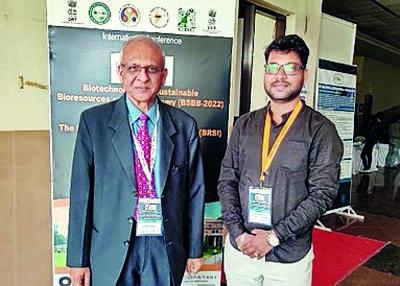Top Searches
- News
- City News
- guwahati News
- ‘Bacteria found in cows can be used to develop bioethanol’
‘Bacteria found in cows can be used to develop bioethanol’

Guwahati: A bacteria found in the stomach of a cow can be used to develop biofuel or bioethanol.
Researchers at the Indian Institute of Technology, Guwahati and the University of Lisbon, Portugal have studied the efficacy of a specific bacterial enzyme found in the rumen of herbivorous mammals in breaking down woody biomatter into simple sugar that can be fermented efficiently to produce bioethanol — a promising renewable fuel that can replace petroleum-based fuel systems. The research has been published in the International Journal of Biological Macromolecules.
The researchers have made a breakthrough by fishing out the enzyme called RfGH5_4 from Ruminococcus flavefaciens bacterium from herbivorous mammals and developing an efficient enzyme machinery to break down cellulose containing biomass or woody structures into simple sugars. RfGH5_4 might be used for the efficient and cost-effective production of bioethanol on an industrial scale.
The IIT-G team of researchers was led by Professor Arun Goyal. The published paper is the research work carried out by Parmeshwar Vitthal Gavande, a doctoral fellow in IIT-G.
Dwindling fossil fuel reserves and the environmental pollution associated with their generation and use has kindled interest of the researchers in resorting to biofuel. “Of the many biofuels known, ethanol (or ethyl alcohol) is widely studied because of its positive impact on the environment. This intoxicating component of spirits and drinks that can also be used to fuel vehicles, is commonly produced by the fermentation of sugar and starch-containing raw materials – grapes, barley, potato, among others,” Professor Goyal of the department of biosciences and bioengineering, IIT-G, said.
Researchers at the Indian Institute of Technology, Guwahati and the University of Lisbon, Portugal have studied the efficacy of a specific bacterial enzyme found in the rumen of herbivorous mammals in breaking down woody biomatter into simple sugar that can be fermented efficiently to produce bioethanol — a promising renewable fuel that can replace petroleum-based fuel systems. The research has been published in the International Journal of Biological Macromolecules.
The researchers have made a breakthrough by fishing out the enzyme called RfGH5_4 from Ruminococcus flavefaciens bacterium from herbivorous mammals and developing an efficient enzyme machinery to break down cellulose containing biomass or woody structures into simple sugars. RfGH5_4 might be used for the efficient and cost-effective production of bioethanol on an industrial scale.
The IIT-G team of researchers was led by Professor Arun Goyal. The published paper is the research work carried out by Parmeshwar Vitthal Gavande, a doctoral fellow in IIT-G.
Dwindling fossil fuel reserves and the environmental pollution associated with their generation and use has kindled interest of the researchers in resorting to biofuel. “Of the many biofuels known, ethanol (or ethyl alcohol) is widely studied because of its positive impact on the environment. This intoxicating component of spirits and drinks that can also be used to fuel vehicles, is commonly produced by the fermentation of sugar and starch-containing raw materials – grapes, barley, potato, among others,” Professor Goyal of the department of biosciences and bioengineering, IIT-G, said.
FOLLOW US ON SOCIAL MEDIA
FacebookTwitterInstagramKOO APPYOUTUBE
Start a Conversation









